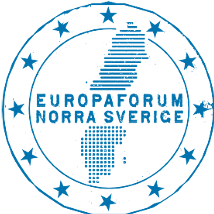Europaforum Northern Sweden (EFNS) is a network for politicians at the local and regional levels from Norrbotten, Västerbotten, Jämtland Härjedalen and Västernorrland. EFNS is a meeting place and a knowledge arena for discussion and analysis of the impacts of EU policy on northern Sweden. EFNS monitors European issues to influence EU legislation, the EU’s strategies and action programmes and the EU’s budget. The objective of EFNS is to safeguard the interests of northern Sweden both in the European arena and in relation to the national levels in matters with a clear European perspective.
- EFNS welcomes the efforts to improve coordination between different funds and the proposal for a common regulatory framework, but is deeply concerned about the proposal to establish one plan per country. EFNS sees a clear risk that this will mean decreased local and regional influence and a displacement of necessary financing for regional development, in favour of short-term national political goals that fail to consider regional and intra-regional differences.
- EFNS, like the Swedish government, is critical of the lack of earmarked funds for the Northern Sparsely Populated Areas (NSPA). EFNS stresses the importance of these funds to address specific challenges such as sparse population, long distances to major markets, small local tax bases, and limited financial resources. Against the backdrop of a deteriorating security situation and northern Sweden’s strategic position in the European Arctic, viable communities in the European periphery is a security concern of importance for the entire Union.
- EFNS believes that regional and territorial chapters in the national and regional plans should be mandatory. With only sectoral chapters, the core principles of cohesion policy – a place- based approach, the partnership principle, and multi-level governance – risk being lost. EFNS also calls for stronger guarantees for genuine implementation of the partnerships, so that measures are effective and can meet regional and local challenges. This should be done through tripartite partnerships, where the regional level is included alongside the national and EU levels, rather than the national level engaging separately with the regions and with the EU.
- EFNS supports the ambition for simpler and more results-based financing, but at the same time wants to emphasize the importance of not disadvantaging small actors and innovative projects. For these, a simplified procedure may be necessary, with a focus on outcomes rather than strictly performance-based measures. It is also important that there are opportunities for alternative forms of financing that take into account local conditions, such as cost levels in sparsely populated areas, and that a long-term approach is maintained to address structural challenges.
- EFNS stresses that competitiveness is best achieved through a bottom-up perspective, where local communities can build on their strengths and invest in long-term capacity building, innovation, and renewal, in line with EU overall competitiveness priorities. Regional smart specialization strategies (S3) should continue to be a central tool to ensure effective measures that capitalize on regional comparative advantages and support capacity building to unlock development potential.
- EFNS supports the ambition for reforms to complement investments. To effectively address structural barriers to growth and development, reforms must be designed with consideration for local and regional conditions. EFNS emphasizes the importance of close dialogue with local and regional levels and highlights regional smart specialization strategies as well as the recent OECD study of the NSPA regions as relevant foundations for policy design.
- EFNS emphasizes that cohesion policy provides strength and incentives for northern Sweden to continue developing for the benefit of the entire EU. EU support has been crucial in developing northern Sweden’s economic structure, strengthening local communities, and increasing innovation capacity, while also contributing to support EU common priorities. An implementation of EU cohesion policy similar to the Recovery and Resilience Facility would risk missing the potential that exists at the local and regional level.
- EFNS believes that from a democratic perspective, and for EU long-term legitimacy, it is of utmost importance that local and regional levels continue to be among the main actors in the shaping of cohesion policy. The current system is not without flaws, but it constitutes a cornerstone that brings EU closer to its citizens. It also ensures that local and regional actors are not only implementers of EU policy, but also co-creators, actively engaged in shaping and legitimizing the European project.
BACKGROUND
EU cohesion policy is the main investment tool for stimulating economic growth and employment at the local and regional level, and it plays a central role in promoting economic integration within the single market. The changed geopolitical situation, following Russia’s war of aggression against Ukraine, has demonstrated the importance of resilient local communities capable of withstanding external shocks, as well as the need for a united Europe. In this respect, EU cohesion policy serves as a key instrument for strengthening regional economic structures, the capacity and innovative ability of businesses and the public sector, while also contributing to shared EU priorities.
The security situation has placed northern Sweden in new strategic focus, where the region’s position in the European Arctic—a globally significant border region—increases its geopolitical importance. At the same time, the region is important in light of the EU initiatives for green industrial transition and the future demand for critical raw materials. This new situation calls for a continued strong cohesion policy that improves people’s opportunities to live, reside and work in northern Sweden. This is important not only from an economic perspective but also as a crucial condition for a safer and more resilient region in an increasingly unstable world.
Adopted by Europaforum Northern Sweden 8 October, 2025
Jonas Andersson (S), Chair, EFNS
Region Jämtland Härjedalen
Åsa Ågren Wikström (M) Vice chair EFNS
Region Västerbotten
Anders Öberg (S) Region Norrbotten
Jonny Lundin (C) Region Västernorrland
Johan Loock (M) Region Jämtland Härjedalen
Daniel Danielsson (C) Association of Municipalities Jämtland Härjedalen
Rickard Carstedt (S) Region Västerbotten
Ann Åström (S) Region Västerbotten
Carina Sammeli (S) Municipalities of Norrbotten
Isak Utsi (S) Municipalities of Norrbotten
Erik Lövgren (S) Association of Municipalities Västernorrland
Dan Rasmusson (SD) Region Västernorrland
Lars-Gunnar Nordlander (S) Association of Municipalities Jämtland Härjedalen

